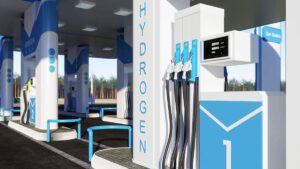Titan Hydrogen’s QUT partnership to bring fuel cell tech to market

Pic: Vertigo3d / E+ via Getty Images
Hydrogen transport innovator Titan Hydrogen has partnered with the Queensland University of Technology to help bring its fuel cell technology to market.
The company, which is currently undertaking a pre-initial public offering raise ahead of launching an IPO either later this year or in early 2022, has a patent application pending for its hydrogen fuel cell technology that it expects to enable an acceleration in the uptake of commercial vehicles fuelled by the clean gas.
It noted that the agreement with QUT will ensure that development of its fuel cell will be supported by state-of-the-art advanced electrochemical systems and a new scanning electrochemical system.
This equipment provides the ability to measure electrochemical and corrosion events on the micron scale while a team led by chief technology officer Dr Andrew Dicks in collaboration with Associate Professor Geoffrey Will will carry out the research.
“Titan holds the patent application to a revolutionary technology that improves the efficiency and reduces consumption of hydrogen of existing fuel cells, making their use much more viable,” Dicks said.
“Not only will we be able to manufacture a more efficient fuel cell for trucks and other large engines, we will be able to licence our technology for use by car manufacturers.”
He added that the research will seek to validate the company’s fuel cell concept, which features a novel nano-structured membrane at its heart.
“The aim of the work is to create a new type of hydrogen fuel cell that is not limited by losses caused by the high overpotentials experienced in currently available devices.”
More bang for your buck
While most of the hydrogen industry is focused on lowering the price of hydrogen production, Titan is seeking to improve efficiency.
The common low temperature Polymer Electrolyte Membrane (PEM) fuel cells currently have low efficiency, converting less than 40% of the energy of the supplied hydrogen into electricity.
As buses and trucks typically require large quantities of hydrogen to achieve reasonable ranges, this reduces the cost effectiveness of fuel cell powered vehicles.
Titan’s technology aims to generate more energy from the same amount of hydrogen, which will substantially decrease the cost of travel.
It seeks to effectively double the driving range of a vehicle by enabling a fuel cell to produce more electricity from the same amount of hydrogen, which will reduce cost while reducing the number of hydrogen refuelling stations required.
Proof of concept testing is expected to begin in the current quarter with the initial stage to be completed by the end of 2021.
Fuel cell electric vehicles are expected to play a major role in the heavy-duty trucks and long-range segments.
In fact, the Hydrogen Council believes FCEVs can achieve breakeven with diesel for heavy-duty long-haul transport by 2028 if hydrogen can be made available for $US4.50 per kg at the pump without the carbon cost.
This article was developed in collaboration with Titan Hydrogen, a Stockhead advertiser at the time of publishing.
This article does not constitute financial product advice. You should consider obtaining independent advice before making any financial decisions.
Related Topics

UNLOCK INSIGHTS
Discover the untold stories of emerging ASX stocks.
Daily news and expert analysis, it's free to subscribe.
By proceeding, you confirm you understand that we handle personal information in accordance with our Privacy Policy.








